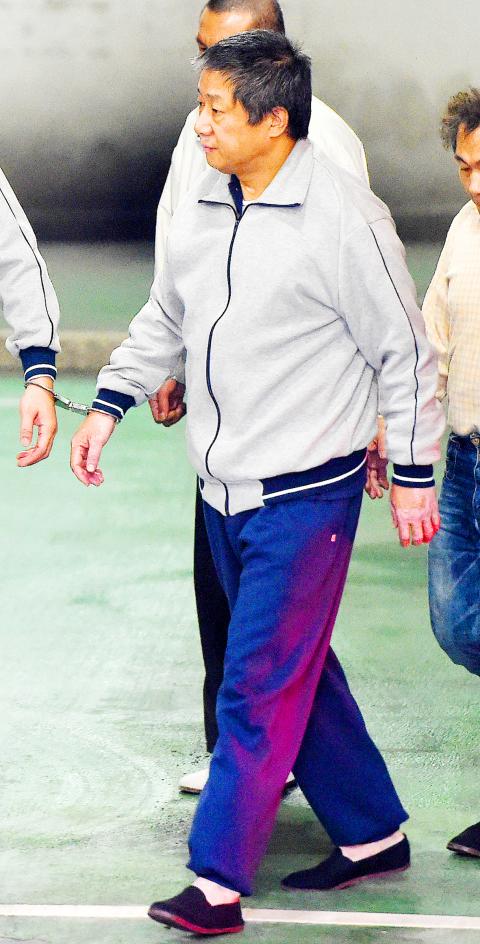The Legislative Yuan’s Judicial Committee is tomorrow to review a draft amendment to the Criminal Code proposed by Democratic Progressive Party (DPP) Legislator Wang Ding-yu (王定宇) stipulating that Chinese spies and their collaborators should be convicted of “offenses against the external security of the state” (外患罪).
None of the punishments stipulated in the Criminal Code of the Armed Forces (陸海空軍刑法), the National Security Act (國家安全法), the Classified National Security Information Protection Act (國家機密保護法) and the National Intelligence Services Act (國家情報工作法) are strict enough to deter spies, Wang said.
While those laws have been amended over the past few years to stipulate stricter penalties, they are still too lenient and have proven ineffective in deterring spies, he said.

Photo: Liao Chen-huei, Taipei Times
Former Chinese People’s Liberation Army intelligence officer Zhen Xiaojiang (鎮小江), the mastermind behind the nation’s most serious security breach, in 2015 received a four-year prison term under the National Security Act.
Retired major general Hsu Nai-chuan (許乃權) was given a 34-month sentence for colluding with Zhen, with his pension payments to resume once he leaves jail.
Had the pair been tried under the Criminal Code, they could have received a life sentence or the death penalty.
However, as the Constitution includes China in the nation’s territory, their crimes are not legally regarded as “foreign aggression.”
The bill aims to circumvent the legal obstacle by changing the wording in the Criminal Code addressing espionage from “foreign nations” (外國) to “foreign nations or the nation’s enemies” (外國或敵人) and from “enemy nations” (敵國) to “enemies” (敵人).
The bill defines “enemies” as “countries or organizations that engage in armed conflict or a military standoff with the Republic of China” (與中華民國交戰或武力對峙之國家或團體), the wording used in the Criminal Code of the Armed Forces.
Only by associating Chinese spies with offenses against the security of the state by a foreign aggressor can they be effectively curbed, Wang said.
Wang submitted the legislation in November last year, but the Chinese Nationalist Party (KMT) caucus struck it down 10 times before the DPP caucus on Tuesday voted to send it to committee review.
The Ministry of Justice said the laws are in place to punish any action that compromises national security or is against the nation’s interests.
It advised against amending the Criminal Code, saying that the wording in one of the bill’s articles alternates between “enemies” and “enemy nations” and includes “the nation,” which it called a loophole.

Taiwanese actress Barbie Hsu (徐熙媛) has died of pneumonia at the age of 48 while on a trip to Japan, where she contracted influenza during the Lunar New Year holiday, her sister confirmed today through an agent. "Our whole family came to Japan for a trip, and my dearest and most kindhearted sister Barbie Hsu died of influenza-induced pneumonia and unfortunately left us," Hsu's sister and talk show hostess Dee Hsu (徐熙娣) said. "I was grateful to be her sister in this life and that we got to care for and spend time with each other. I will always be grateful to

UNITED: The premier said Trump’s tariff comments provided a great opportunity for the private and public sectors to come together to maintain the nation’s chip advantage The government is considering ways to assist the nation’s semiconductor industry or hosting collaborative projects with the private sector after US President Donald Trump threatened to impose a 100 percent tariff on chips exported to the US, Premier Cho Jung-tai (卓榮泰) said yesterday. Trump on Monday told Republican members of the US Congress about plans to impose sweeping tariffs on semiconductors, steel, aluminum, copper and pharmaceuticals “in the very near future.” “It’s time for the United States to return to the system that made us richer and more powerful than ever before,” Trump said at the Republican Issues Conference in Miami, Florida. “They

REMINDER: Of the 6.78 million doses of flu vaccine Taiwan purchased for this flu season, about 200,000 are still available, an official said, following Big S’ death As news broke of the death of Taiwanese actress and singer Barbie Hsu (徐熙媛), also known as Big S (大S), from severe flu complications, the Centers for Disease Control (CDC) and doctors yesterday urged people at high risk to get vaccinated and be alert to signs of severe illness. Hsu’s family yesterday confirmed that the actress died on a family holiday in Japan due to pneumonia during the Lunar New Year holiday. CDC Deputy Director-General Tseng Shu-hui (曾淑慧) told an impromptu news conference that hospital visits for flu-like illnesses from Jan. 19 to Jan. 25 reached 162,352 — the highest

TAIWAN DEFENSE: The initiative would involve integrating various systems in a fast-paced manner through the use of common software to obstruct a Chinese invasion The first tranche of the US Navy’s “Replicator” initiative aimed at obstructing a Chinese invasion of Taiwan would be ready by August, a US Naval Institute (USNI) News report on Tuesday said. The initiative is part of a larger defense strategy for Taiwan, and would involve launching thousands of uncrewed submarines, surface vessels and aerial vehicles around Taiwan to buy the nation and its partners time to assemble a response. The plan was first made public by the Washington Post in June last year, when it cited comments by US Indo-Pacific Commander Admiral Samuel Paparo on the sidelines of the Shangri-La Dialogue